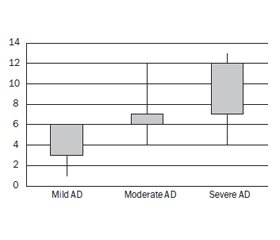Журнал «Здоровье ребенка» Том 18, №1, 2023
Вернуться к номеру
Вивчення впливу атопічного дерматиту в дітей на якість життя сімей
Авторы: O. Mozyrska
Bogomolets National Medical University, Kyiv, Ukraine
Рубрики: Педиатрия/Неонатология
Разделы: Клинические исследования
Версия для печати
Актуальність. Атопічний дерматит — це хронічне рецидивуюче захворювання шкіри. Хоча атопічний дерматит зустрічається переважно в дітей, він сильно впливає на життя всієї родини. Мета: оцінити якість життя сім’ї дітей з атопічним дерматитом та вивчити кореляцію між тяжкістю атопічного дерматиту та якістю життя членів сім’ї за опитувальником Family Dermatology Life Quality Index (FDLQI). Матеріали та методи. У дослідження були включені 104 пацієнти з атопічним дерматитом віком від 6 місяців до 17 років (медіана 6 [3; 9] років) з алергологічного відділення Київської міської дитячої клінічної лікарні № 2. Клінічні показники включали вік, стать, тривалість захворювання та тяжкість атопічного дерматиту. Останню оцінювали за індексом SCORAD. Для кореляційного аналізу показників FDLQI та SCORAD використовували індекс рангової кореляції Спірмена. P < 0,05 вважалося статистично значущим. Результати. За допомогою опитувальника FDLQI оцінено якість життя сімей 104 пацієнтів з атопічним дерматитом. Четверо батьків (3,8 %) повідомили про відсутність впливу захворювання на якість життя сім’ї, 65 (62,5 %) — про незначний вплив, 34 (32,7 %) — помірний, батьки 1 пацієнта (1,0 %) вказали на дуже великий ефект. Середня оцінка за опитувальником FDLQI становила 6,4 ± 2,8 бала. Спостерігалася кореляція між показником FDLQI та індексом тяжкості за SCORAD (Ro = 0,714, p < 0,01). У підгрупі дітей віком до 4 років виявлено сильний кореляційний зв’язок між параметрами FDLQI та SCORAD (Ro = 0,789, р < 0,01). Вік дітей та тривалість захворювання не були пов’язані з оцінкою якості життя (Ro = –0,011, p > 0,05 та Ro = 0,076, p > 0,05 відповідно). У підгрупі дітей віком 4–17 років також встановлено сильний позитивний кореляційний зв’язок показників FDLQI та SCORAD (Ro = 0,714, p < 0,01). Вік дітей та тривалість захворювання не були пов’язані з оцінкою якості життя (Ro = –0,011, p > 0,05 та Ro = –0,027, p > 0,05 відповідно), хоча в підгрупі дітей молодшого віку (4–7 років) відзначено тенденцію до більшого впливу хвороби на якість життя сім’ї. Висновок. У цьому дослідженні більшість батьків дітей з атопічним дерматитом повідомили про легкий або помірний вплив захворювання на якість їхнього життя. Показник FDLQI членів родини корелював із ступенем тяжкості атопічного дерматиту.
Background. Atopic dermatitis is a chronic, relapsing eczema. Although atopic dermatitis occurs mainly in children, it greatly affects the life of the whole family. The purpose was to assess the quality of life of the families of children with atopic dermatitis and to study the correlation between the severity of atopic dermatitis and the quality of life of family members according to the Family Dermatology Life Quality Index (FDLQI) questionnaire. Materials and methods. The study included 104 patients with atopic dermatitis aged 6 months to 17 years (median of 6 [3; 9] years) who were treated at the Allergy Department of the Kyiv City Children’s Clinical Hospital 2. Clinical parameters included age, sex of the patients, disease duration and severity of atopic dermatitis. The latter was assessed by the SCORing for Atopic Dermatitis (SCORAD) tool. Spearman’s rank correlation index was used for analysis of correlation between FDLQI and SCORAD indicators. Р < 0.05 was considered statistically significant. Results. The quality of life of the family of 104 children with atopic dermatitis was assessed using the FDLQI questionnaire. Four parents (3.8 %) reported no impact of the disease on the family’s quality of life, 65 (62.5 %) — a mild effect, 34 (32.7 %) — a moderate impact, parents of 1 patient (1.0 %) noted a very large effect. The average FDLQI was 6.4 ± 2.8. There was a correlation between the FDLQI and the SCORAD severity index (Ro = 0.714, p < 0.01). In the subgroup of children under 4 years of age, a strong correlation between the FDLQI and the SCORAD was found (Ro = 0.789, p < 0.01). Child’s age and disease duration were not associated with the quality of life score (Ro = –0.011, p > 0.05 and Ro = 0.076, p > 0.05, respectively). In the subgroup of children aged 4–17 years, a strong positive correlation of FDLQI and the SCORAD was also determined (Ro = 0.714, p < 0.01). The age of the children and the duration of the disease were not related to the quality of life score (Ro = –0.011, p > 0.05 and Ro = –0.027, p > 0.05, respectively), although in the subgroup of younger children (4–7 years) we noted a tendency towards a greater influence of the disease on the family’s quality of life. Conclusion. In this study, most parents of children with atopic dermatitis reported a mild to moderate impact of the disease on their quality of life. The FDLQI of family members correlated with the severity of atopic dermatitis.
атопічний дерматит; якість життя; анкета; діти
atopic dermatitis; quality of life; questionnaire; children

